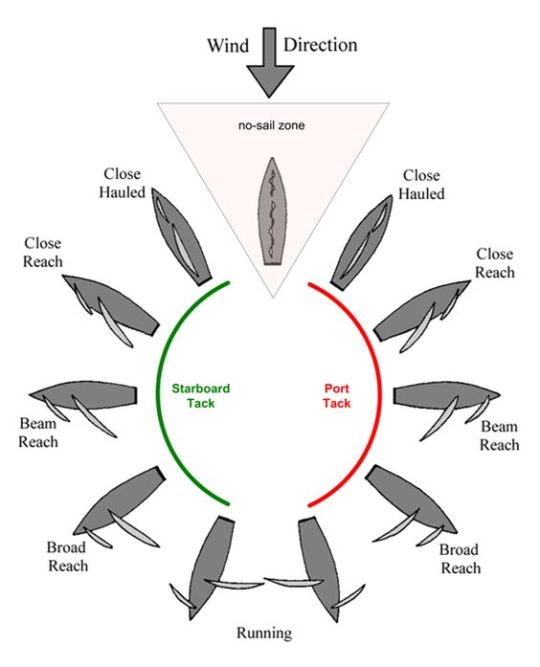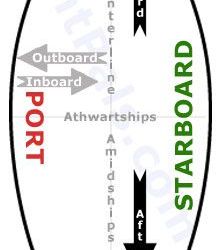Note
Hello! I always see in writing how "and his eyes turned to cresents" and similar expressions. What does it mean and how would I go about using the term correctly?
Facial Expressions: The Eyes
I'm assuming "his eyes turned to crescents" probably comes from writing anime fan-fiction, as eyes turning to a crescent shape is a common means of illustrating emotion in anime. Outside of anime fan-fiction however, it has no meaning, because real human eyes don't turn to crescents. They can partially close, narrow, pinch, or squint, but "his eyes turned to crescents" has confusing connotations when applied to an actual human rather than an anime character.
Options for showing emotion in non-anime human eyes:
-- Eyes narrowed: suspicion, anger, deep thought
-- Eyes twinkled: adoration, happiness, excitement
-- Eyes darted away: guilt, anxiety, disagreement
-- Eyes widened: shock, surprise, amazement
-- Eyes shut: frustration, disappointment, sadness
-- Eyes hardened: anger, distrust, emotional cutoff
-- Eyes pinched: annoyance, consideration, deep thought
-- Eyes rolled: exasperation, disbelief, annoyance
-- Eyes bulged: shock, fear, strong dismay
-- Eyes blinked rapidly: distress, discomfort
-- Eyes dilated: interest, extreme happiness, arousal
As far as similar expressions go, what you're generally looking for is called "facial expressions" which are a type of body language that convey emotion. See the following posts for more:
Showing a Character’s Feelings
Illustrating Emotion with Eyes/Eye Movements
•••••••••••••••••••••••••••••••••
I’ve been writing seriously for over 30 years and love to share what I’ve learned. Have a writing question? My inbox is always open!
♦ Questions that violate my ask policies will be deleted!
♦ Please see my master list of top posts before asking
♦ Learn more about WQA here
77 notes
·
View notes
Text
I want to write a book called “your character dies in the woods” that details all the pitfalls and dangers of being out on the road & in the wild for people without outdoors/wilderness experience bc I cannot keep reading narratives brush over life threatening conditions like nothing is happening.
I just read a book by one of my favorite authors whose plots are essentially airtight, but the MC was walking on a country road on a cold winter night and she was knocked down and fell into a drainage ditch covered in ice, broke through and got covered in icy mud and water.
Then she had a “miserable” 3 more miles to walk to the inn.
Babes she would not MAKE it to that inn.
98K notes
·
View notes
Note
Hi! I've written more than half of my book in first person pov. I was really proud of most of it but the longer it goes, the more the narration becomes as if the protagonist is 'the walls' all the time. Especially in scenes with a crowd of characters, it sounds like she's constantly reporting everything rather than seeing it. I don't know how this came to be but I'm struggling to fix it.
First-Person Narration Feels More Tell Than Show
It sounds like the issue you're having falls into the "show, don't tell" camp in that you're doing more telling (reporting) than showing (character actually experiencing something.)
I want to preface this by saying there's nothing inherently wrong with "telling." It's not that you can never do it, it's just that you should know when to do it and when not to. I cover that in my post When “Telling” is Okay.
The rest of the time--when it makes sense--you can avoid the over dependence on "reporting" by "showing" your character actually experiencing things. For example...
Telling/reporting: I pushed the curtains aside and peered out the window. It was raining and sun was beginning to set.
>>> "it was raining"
>>> "the sun was beginning to set"
Showing/experiencing: I pushed the curtains aside and peered through the rain-streaked window. The golden light of the falling sun glittered across the wet lawn.
>>> "rain-streaked window"
>>> "wet lawn"
>>> "the golden light of the falling sun"
For more help, you can refer to my guide to Showing vs Telling. I hope that helps!
•••••••••••••••••••••••••••••••••
I’ve been writing seriously for over 30 years and love to share what I’ve learned. Have a writing question? My inbox is always open!
LEARN MORE about WQA
SEE MY ask policies
VISIT MY Master List of Top Posts
COFFEE & FEEDBACK COMMISSIONS ko-fi.com/wqa
42 notes
·
View notes
Note
ant tips on writing episodoc story but still having an overarching plot?
Overarching Plot for Episodic Story
It really depends on how you want to structure your overall story. With an episodic story, you can either take a big story and break it into smaller pieces--at which point the overarching plot is just the regular plot--or you can follow a TV show model and tell more encapsulated stories that are united beneath an overarching plot.
In the case of breaking a story into smaller pieces, you're going to flesh out your plot and structure the way you would if you were writing a novella or novel. Then, you'll look for natural "episodes" within to break up the story. Most of the episodes will likely center around a story beat, such as the introduction, the inciting incident, the dark night of the soul, etc. In this scenario, the story is the story. The story you're telling is the one that resolves the main conflict.
In the case of a TV show model, you're sort of telling stories within a bigger story. I like to use The X-Files as an example here... the overarching story (aka the "myth arc") of TXF was aliens and the government conspiracy to hide their existence. But the everyday story was two FBI agents tasked with investigating unsolved paranormal cases. Many of the episodes were stand alone stories known in TV as "monster of the week episodes," because they center around a different conflict or "monster" each week rather than being progressive segments of a primary conflict. However, the "myth arc" would be explored and furthered with periodic "myth arc episodes" where the central conflict was specific to the myth arc. And, sometimes monster of the week episodes would tie back to the myth arc or would have a myth arc subplot. So, in this type of story, you still want to look at the premise and flesh out the main plot as you would for any other story, figuring out the "myth arc" conflict, the "big bad," and what the protagonist must do to resolve the myth arc conflict and defeat the big bad. However, rather than break that story up into smaller pieces, you'll figure out a "monster of the week" framework that works with the premise and allows you to develop the characters, explore the world, and tie in bits of the "myth arc."
Happy writing!
•••••••••••••••••••••••••••••••••
I’ve been writing seriously for over 30 years and love to share what I’ve learned. Have a writing question? My inbox is always open!
LEARN MORE about WQA
SEE MY ask policies
VISIT MY Master List of Top Posts
COFFEE & FEEDBACK COMMISSIONS ko-fi.com/wqa
172 notes
·
View notes
Text
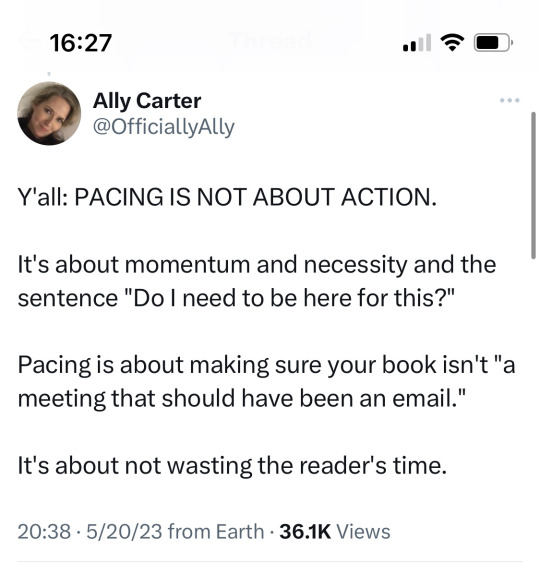
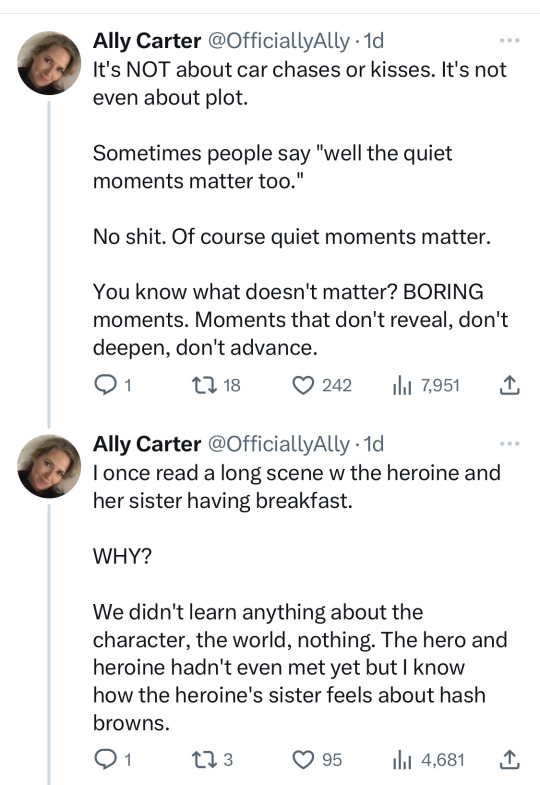
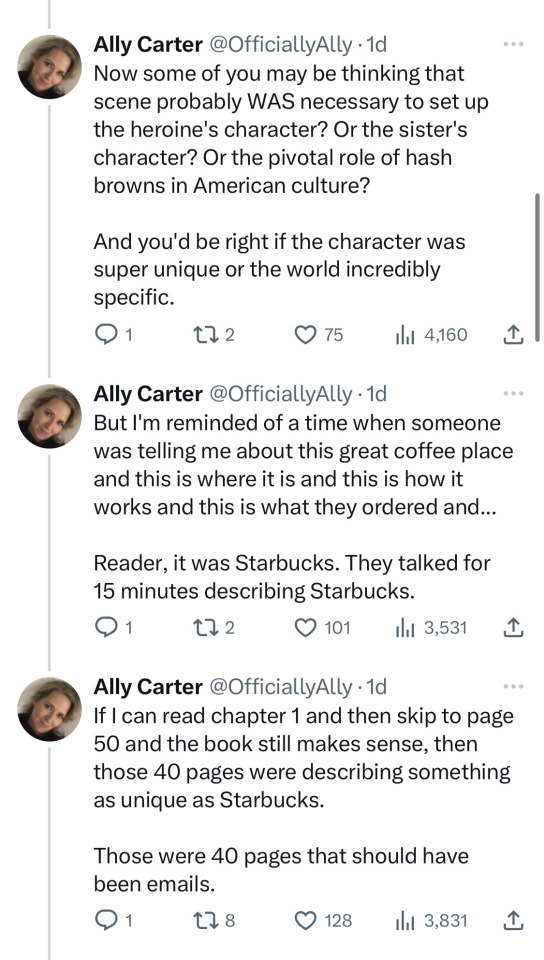
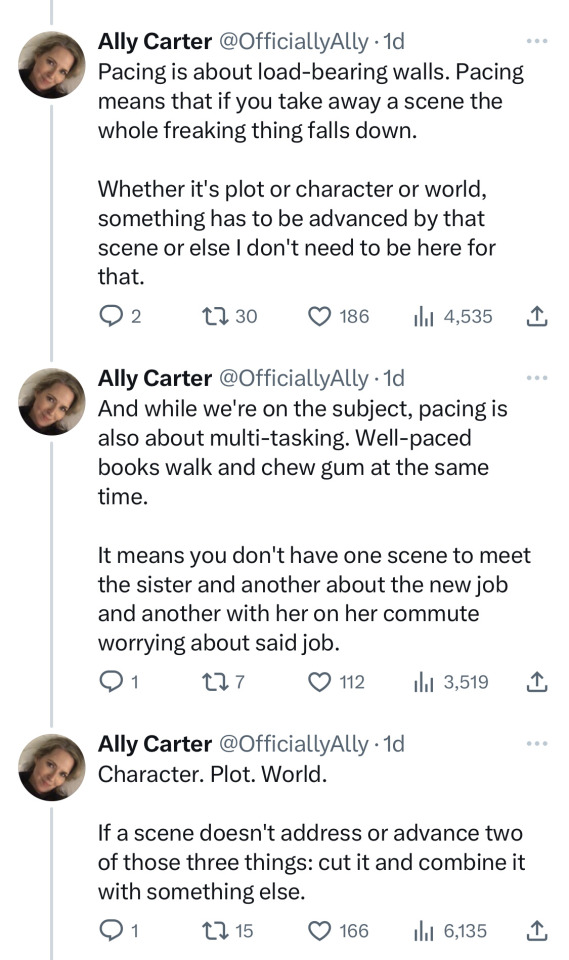
PACING IS ABOUT LOAD BEARING WALLS.
*staples violently to my own forehead*
24K notes
·
View notes
Text
5 Tips for Creating Intimidating Antagonists
Antagonists, whether people, the world, an object, or something else are integral to giving your story stakes and enough conflict to challenge your character enough to change them. Today I’m just going to focus on people antagonists because they are the easiest to do this with!
1. Your antagonist is still a character
While sure, antagonists exist in the story to combat your MC and make their lives and quest difficult, they are still characters in the story—they are still people in the world.
Antagonists lacking in this humanity may land flat or uninteresting, and it’s more likely they’ll fall into trope territory.
You should treat your antagonists like any other character. They should have goals, objectives, flaws, backstories, etc. (check out my character creation stuff here). They may even go through their own character arc, even if that doesn’t necessarily lead them to the ‘good’ side.
Really effective antagonists are human enough for us to see ourselves in them—in another universe, we could even be them.
2. They’re… antagonistic
There’s two types of antagonist. Type A and Type B. Type A antagonist’s have a goal that is opposite the MC’s. Type B’s goal is the same as the MC’s, but their objectives contradict each other.
For example, in Type A, your MC wants to win the contest, your antagonist wants them to lose.
In Type B, your MC wants to win the contest, and your antagonist wants to win the same contest. They can’t both win, so the way they get to their goal goes against each other.
A is where you get your Draco Malfoy’s, other school bullies, or President Snow’s (they don’t necessarily want what the MC does, they just don’t want them to have it.)
B is where you get the other Hunger Games contestants, or any adventure movie where the villain wants the secret treasure that the MCs are also hunting down. They want the same thing.
3. They have well-formed motivations
While we as the writers know that your antagonist was conceptualized to get in the way of the MC, they don’t know that. To them, they exist separate from the MC, and have their own reasons for doing what they do.
In Type A antagonists, whatever the MC wants would be bad for them in some way—so they can’t let them have it. For example, your MC wants to destroy Amazon, Jeff Bezos wants them not to do that. Why not? He wants to continue making money. To him, the MC getting what they want would take away something he has.
Other motivations could be: MC’s success would take away an opportunity they want, lose them power or fame or money or love, it could reveal something harmful about them—harming their reputation. It could even, in some cases, cause them physical harm.
This doesn’t necessarily have to be true, but the antagonist has to believe it’s true. Such as, if MC wins the competition, my wife will leave me for them. Maybe she absolutely wouldn’t, but your antagonist isn’t going to take that chance anyway.
In Type B antagonists, they want the same thing as the MC. In this case, their motivations could be literally anything. They want to win the competition to have enough money to save their family farm, or to prove to their family that they can succeed at something, or to bring them fame so that they won’t die a ‘nobody’.
They have a motivation separate from the MC, but that pesky protagonist keeps getting in their way.
4. They have power over the MC
Antagonists that aren’t able to combat the MC very well aren’t very interesting. Their job is to set the MC back, so they should be able to impact their journey and lives. They need some sort of advantage, privilege, or power over the MC.
President Snow has armies and the force of his system to squash Katniss. She’s able to survive through political tension and her own army of rebels, but he looms an incredibly formidable foe.
Your antagonist may be more wealthy, powerful, influential, intelligent, or skilled. They may have more people on their side. They are superior in some way to the protagonist.
5. And sometimes they win
Leading from the last point, your antagonists need wins. They need to get their way sometimes, which means your protagonist has to lose. You can do a bit of a trade off that allows your protagonist to lose enough to make a formidable foe out of their antagonist, but still allows them some progress using Fortunately, Unfortunately.
It goes like… Fortunately, MC gets accepted into the competition. Unfortunately, the antagonist convinces the rest of the competitors to hate them. Fortunately, they make one friend. Unfortunately, their first entry into the competition gets sabotaged. Fortunately, they make it through the first round anyway, etc. etc.
An antagonist that doesn’t do any antagonizing isn’t very interesting, and is completely pointless in their purpose to heighten stakes and create conflict for your protagonist to overcome. We’ll probably be talking about antagonists more soon!
Anything I missed?
2K notes
·
View notes
Text
Conducting a War
So, your story takes place during a war. Maybe your characters are experiencing war or maybe they're waging war against other characters or groups. Likely, you are not a general or expert in warfare. How do you write a story that is set during a war?
Who's fighting who?
The first, most obvious, step is to know who is fighting whom and why. Wars are between groups of people. They can be a small clan, a massive nation, or even an entire planet or galaxy. Two characters fighting it out are not considered "at war" because they are representing themselves and settling an individual dispute, even if it is a high-stakes dispute.
Why are the parties in your story fighting? There are a lot of different reasons why two groups of people would go to war against each other, but most wars are over resources at their center. Disputes over land and borders, over who gets what crops and for what price, and even religious wars are usually about the resources available and scarcity. So when you're talking about war, you need to know what either side wants. Just like a character, your war parties need to have desires and stakes.
"Resources" can mean just about anything that society needs. Food, fresh water, opportunities for trade, minerals, metals, building materials, and wealth are all examples of resources your war parties can fight over.
What does it take to wage war?
Wars require resources too. It's not just about getting resources but spending resources as well. When nations go to war in the real world, there are opportunities for people to make exorbitant amounts of money and wealth by taking advantage of a wartime economy.
The parties waging war need people to fight their battles. They need to pay those people, arm them, feed and clothe them, and transport them to where they need to be. Where does the government or person in charge get the food, armor, weapons, and transportation? Where do they allocate those scarce resources? Oftentimes in war, those in charge must make sacrifices. Is there a portion of land that the person in charge gives up to protect another portion with their limited resources?
There are unlimited stories hidden in these questions, and a large base of world-building will help to answer these questions in depth. There are many opportunities for tension and rising stakes for your war parties in the event that the opposing side makes acquiring war resources difficult or impossible.
Types of Armies
Your armies tell you a lot about the resources available to your characters and how you can build your story and plot line around the war. So I'll discuss the differences between four types of armies that exist in the real world and throughout history. These are examples; you can change or twist these examples however best suits your story.
The first is a professional army. These guys are paid and trained by the state; being in the army is their entire job. The army can fill a number of different roles other than fighting, but their purpose is to provide martial protection to the people of their nation and carry out martial orders from the government or sovereign entity in charge. Important aspects of a professional army to consider: these soldiers are paid for their work, they are trained by professionals, and oftentimes they follow a hierarchy or chain of command. Most governments provide medical care to their professional armies, but this isn't required. The soldiers can be conscripted or voluntary.
Next up is a mercenary army. This army is also paid for their services, but they are not trained by the state, and they ultimately take their orders from the organization, not the government. The government commissions the mercenary army for their services. The government does not provide most of the resources required to maintain an army. They pay for the army but don't necessarily feed, arm, or clothe them.
A fyrd is a historical term that refers specifically to the Anglo-Saxon armies raised by different Lords and Thegns to protect their lands and shires. These armies consisted of civilians and able-bodied free men from the local settlements and farms gathered by the ealdorman. They were conscripted into the service, and they lacked formal martial training. Also, importantly, their provisions and weapons were provided by the soldiers themselves. Meaning you will see fewer long swords and forged weapons for the purposes of fighting and more axes and improvised weaponry. The purposes of the improvised weaponry are primarily as other tools, such as axes for chopping wood and knives for butchery. Any horses or mules brought along for work or fighting are the property of the lords or farm owners who provided them.
A militia is very similar to a fyrd; this army consists of civilians who are paid or conscripted into service by the government but are not professional soldiers. These militias may sometimes have training from professional soldiers among their ranks, but mostly they are civilians training themselves. The soldiers provide their provisions, weaponry, and armor, meaning that the wealth has to come from the soldiers and their professional jobs and not from their martial services. The militia is a more modern term, but it is marginally different in that most militias we think of today are voluntary and not conscripted.
Battle Strategy
This is where a little research may help you. Battles behave differently depending on different factors. What technology and weaponry is available to your war parties? Are we talking about bladed weapons or guns or lasers? Is your army a professional or mercenary army, or is it more like a fyrd or militia?
When setting up a battle in your story, focus on the differences between the two armies and how that may affect their strategy toward fighting or engaging the enemy. If your fyrd faces a professional army, they may encounter some problems regarding weaponry and armor. Your fyrd will struggle to match a professional army in defending against well-made weapons and professional training. How do they work to compensate for those weaknesses?
When looking at two equally armed and trained armies, a general or battle strategist will look to the terrain to plan a battle. Generally, controlling the high ground helps in battles. If one army has a heavy cavalry presence, your opposing army may want anti-cavalry measures in place. Do they have the space to do so? Urban areas will lend themselves well to guerilla-style and urban warfare tactics. Jungles and forests will look different to hills and plains, and deserts bring unique problems to a battle that a mountainous terrain might not.
What is the battle for? Battles have a purpose; otherwise, there would be no value to the loss of troops. What is worth the risk of losing lives? Does the battle have stakes? Some stakes that might be worth conducting a battle over include taking control of a river pass, allowing naval trade and travel, cutting off control of a trade route to the enemy, or invading an important town or city to process and refine necessary materials.
Ending the War
The war will eventually end if your characters are lucky. But what ends a war? Wars usually end with agreements between the two opposing parties following surrender or extension of peaceful negotiations. Negotiating what each party needs or wants is an art in and of itself. Each party must come to the agreement that waging war further is more expensive and less rewarding than ending violent opposition with concessions made by either side.
Conclusion
Wars and battles are like characters; they have needs, desires, and stakes. Writing your characters in a war or battle will hinge on the needs and stakes of the greater war and story. Important questions to ask are: what are we fighting for? Who are we fighting? And what happens if we don't fight?
–Indy
925 notes
·
View notes
Text
one of the reasons why "what if people went on a road trip and it was weird" is one of the oldest story types is that a lot of sense of personhood has been, historically, tied to place. the weird road trip says "what if we went somewhere else, where no one knows us, and tried out being a different person".
Odysseus, the famous liar, goes on a weird road trip & over the course of it becomes several different people, and then comes home & is all those people as well as himself, wearing the echoes of those other people
77K notes
·
View notes
Text
A Workshop for Creating Magical/ Fictional Crystals: A Guide from a Geologist
Hi folks, its me, here to talk about fictional writing again! Today I'm just tackling the idea of magical stones/mana stones by looking at existing minerals today and some neat properties that they have, and how you can apply these things to a fictional world. The goal is mainly to help you if you are stuck trying to come up with a unique magic system, or a unique identification/characteristic of your mineral.
First Things First: Mineral Shapes

I am exhausted, petered out, down-right fatigued by seeing every mineral depicted with having the crystal structure of calcite and quartz. There are soooooo many cooler, more interesting crystal structures, don't you think you would stop and take a look at a perfect cube in nature? It is completely unsettling.
Second: Color
Color within minerals can either be really important, or not important at all! It is your choice to decide if color is going to be something that means something to your mineral. But what are some times when the color is important? Well.... there are some elements that are called chromophores, this classification just indicates that these elements, when present, will determine the color of whatever they are in. So, if you wanted to treat mana like a chromophore, you could say, "Oh everything that contains mana turns green!" This could mean that regardless of the mineral, if that mineral is a specific color, it means it contains mana. This concept is exciting because you can just stop here and use minerals that already exist! You can also use it as an indicator for a magical ore! Chromophores are typically metals, so if you are making a new metal weapon, making the ore of that metal a unique color would make a lot of sense!
However, your mineral can also just be every color of the rainbow like quartz and perhaps that's what makes identifying your mana stones elusive and create an illusion of scarcity that your character can solve.

There are other things that can change the colors of minerals, like radiation damage, and electron exchange, but I think that is beyond what would be helpful! So lets talk about some unique color properties that happen in nature that seem magical in the first place! Maybe you don't need to design a mana stone, but you want a unique gemstone that only the royal family passes down or something (IDK).
The first one is the alexandrite effect! This is where a mineral can change color in natural light vs. incandescent light. (the mineral itself is not changing, but the lights contain different amounts of different colors that then get absorbed by the stone). Even if you don't use electricity in your fictional world, you could have the colors change in the presence of light magic. This could create fun misunderstandings about what the mineral is reacting to!
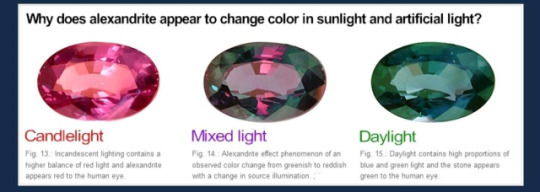
Pleochroism
Pleochroism is something that most minerals have, it is frequently used to help identify minerals in thin sections, however minerals are usually not pleochroic enough for it to be visible to the naked eye! Pleochroism is just a fancy name to describe the change in how light is absorbed based on the angle of the mineral! So if you scroll up to the first image where I showed a lot of crystal shapes, most of them have angles where they are longer and shorter! This will effect the way light travels in the crystal. Tanzanite is a popular mineral that does this.

Photochromism
This is when a mineral will change color (in a reversible way) when exposed to UV light (or sunlight), I am not going to go too into the details of why this is happening because it would require me to read some research papers and I just don't feel like it. The mineral that is best known for this is Hackmanite!
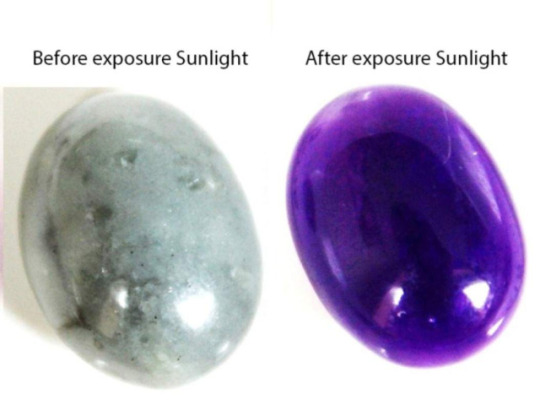
Alright! These are all the really cool color effects that might inspire you or maybe not, but now I am going to talk about how you might find your minerals within a rock!
When I see a lot of magical caves/mines, typically I see them with some variation of a geode honestly, but most minerals are not found like that! Now I am sure most of you guys have seen a geode, so I will not really talk about those, but I will talk briefly about porphyroblasts which is when the mineral grows larger than the minerals around it, this happens in metamorphic minerals!

sorry random stranger, but this is an image of garnets inside a finer-grained rock at gore mountain in New York!
Another way you might find minerals is in a pegmatite! This is when all minerals are really large! This is a formed from really slow crystalizing magma!
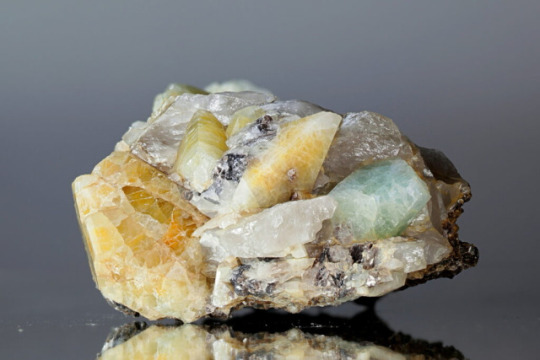
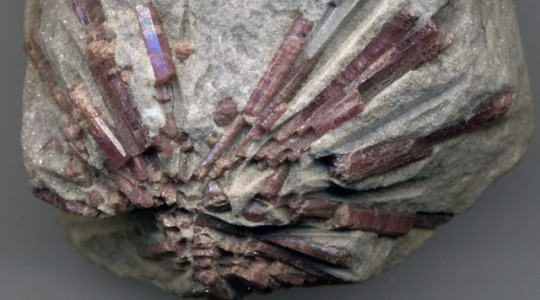
But something else to think about is that your mineral might just be massive, it doesn't have to have distinct crystals, it may be similar to jadeite where small grains grow together which leaves it looking smooth and seamless! A note about all of these is that you would have to mine into the rock to find these, there would not be any natural caves in these rocks! Caves are only ever really formed in limestones and maybe marbles (rocks that react with acid).
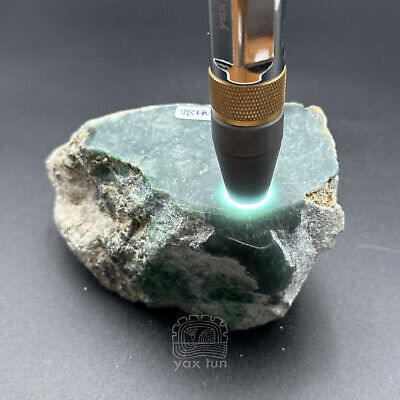
How can your characters identify these minerals?
Typically when you are out in the field you will look to see what type of rocks the minerals are found in (The overall texture of the rock will tell you how it formed). If you know how the rock formed, it will narrow down the amount of minerals you need to think about by quite a bit! Next, you are going to look closely at it and observe its crystal structure, does it have an obvious crystal? if so what is the general shape? If it is broken, how did it break? Did it fracture like glass or did it break along uniform planes. Some minerals have a thing called cleavage (breaks along planes of weakness). If a mineral exhibits this habit, it will again help narrow this down. Next we can look at color. Color can be misleading, because minerals like quartz can be any color imaginable, but minerals like olivine will always be green! The next thing your character can do is test for hardness, minerals all have a specific hardness that can help identify it as well.
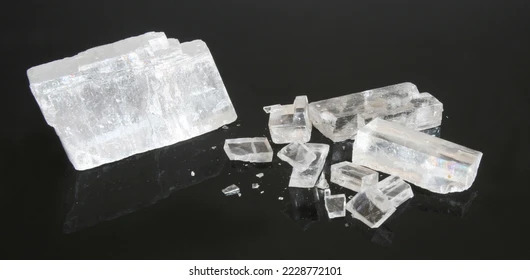
After you go through all of this, your mineral might have some special property! This could be magnetism, fluorescence, reactions to acid, or any of the color changing effects I mentioned above! Other than that, your character can take it back to a lab and do a number of things to identify it, but the most typical thing would be for them to make a thin section (very thin piece of the rock) and observe it under a cross polarized microscope!

On that note folks! I hope this helped in some way in thinking of new magic mineral properties! I have other guides that explore some different fictional worldbuilding issues you might run into, but if you have any topics you would like me to cover please that I haven't mentioned already, let me know!
4K notes
·
View notes
Text
something I've recently noticed with characters -- mainly my d&d characters -- is that backstories are especially fun if you take a trope or a common backstory but change your character's role in it. Bonus points if they're the "villain" in this trope, whether by accident/misunderstanding or actions they intended to do but will/do regret after character development.
"my parents were killed by a (vampire/evil wizard/raging maniac/whatever)" but you're the one who killed someone's parents and now they're out to fucking Get You.
"my spouse/significant other died and I'm out to avenge them" but you're an undead or have the Reborn lineage or something and you're the dead spouse trying to find your revenge-obsessed lover before they do something they'll regret.
"my village was taken over by a tyrant" but you're the tyrant who's been chased out and fallen out of power and now you have to get Away From Here Fast.
"my noble family's manor burned down and I want to find the person who did it" but you're the housemaid who's been cast aside and put out of a job, and needs a quick way to make some money.
it sort of instantly gives the character more depth and makes the backstory feel more three-dimensional. Your character has done something wrong, whether by accident or on purpose, and that makes them feel more human. Not to mention the fact that many of these automatically create the easy-to-harness plot device of Someone Is After Me.
Anyways, hope that's helpful in some way :> happy character making!
4K notes
·
View notes
Text
Things That May Be Causing Your Writer's Block- and How to Beat Them
I don't like the term 'Writer's Block' - not because it isn't real, but because the term is so vague that it's useless. Hundreds of issues all get lumped together under this one umbrella, making writer's block seem like this all-powerful boogeyman that's impossible to beat. Worse yet, it leaves people giving and receiving advice that is completely ineffective because people often don't realize they're talking about entirely different issues.
In my experience, the key to beating writer's block is figuring out what the block even is, so I put together a list of Actual Reasons why you may be struggling to write:
(note that any case of writer's block is usually a mix of two or more)
Perfectionism (most common)
What it looks like:
You write one sentence and spend the next hour googling "synonyms for ___"
Write. Erase. Write. Rewrite. Erase.
Should I even start writing this scene when I haven't figured out this one specific detail yet?
I hate everything I write
Cringing while writing
My first draft must be perfect, or else I'm a terrible writer
Things that can help:
Give yourself permission to suck
Keep in mind that nothing you write is going to be perfect, especially your first draft
Think of writing your first/early drafts not as writing, but sketching out a loose foundation to build upon later
People write multiple drafts for a reason: write now, edit later
Stop googling synonyms and save that for editing
Write with a pen to reduce temptation to erase
Embrace leaving blank spaces in your writing when you can't think of the right word, name, or detail
It's okay if your writing sucks. We all suck at some point. Embrace the growth mindset, and focus on getting words on a page
Lack of inspiration (easiest to fix)
What it looks like:
Head empty, no ideas
What do I even write about???
I don't have a plot, I just have an image
Want to write but no story to write
Things that can help:
Google writing prompts
If writing prompts aren't your thing, instead try thinking about what kind of tropes/genres/story elements you would like to try out
Instead of thinking about the story you would like to write, think about the story you would like to read, and write that
It's okay if you don't have a fully fleshed out story idea. Even if it's just an image or a line of dialogue, it's okay to write that. A story may or may not come out of it, but at least you got the creative juices flowing
Stop writing. Step away from your desk and let yourself naturally get inspired. Go for a walk, read a book, travel, play video games, research history, etc. Don't force ideas, but do open up your mind to them
If you're like me, world-building may come more naturally than plotting. Design the world first and let the story come later
Boredom/Understimulation (lost the flow)
What it looks like:
I know I should be writing but uugggghhhh I just can'tttttt
Writing words feels like pulling teeth
I started writing, but then I got bored/distracted
I enjoy the idea of writing, but the actual process makes me want to throw my laptop out the window
Things that can help:
Introduce stimulation: snacks, beverages, gum, music such as lo-fi, blankets, decorate your writing space, get a clickity-clackity keyboard, etc.
Add variety: write in a new location, try a new idea/different story for a day or so, switch up how you write (pen and paper vs. computer) or try voice recording or text-to-speech
Gamify writing: create an arbitrary challenge, such as trying to see how many words you can write in a set time and try to beat your high score
Find a writing buddy or join a writer's group
Give yourself a reward for every writing milestone, even if it's just writing a paragraph
Ask yourself whether this project you're working on is something you really want to be doing, and be honest with your answer
Intimidation/Procrastination (often related to perfectionism, but not always)
What it looks like:
I was feeling really motivated to write, but then I opened my laptop
I don't even know where to start
I love writing, but I can never seem to get started
I'll write tomorrow. I mean next week. Next month? Next month, I swear (doesn't write next month)
Can't find the time or energy
Unreasonable expectations (I should be able to write 10,000 words a day, right????)
Feeling discouraged and wondering why I'm even trying
Things that can help:
Follow the 2 min rule (or the 1 paragraph rule, which works better for me): whenever you sit down to write, tell yourself that you are only going to write for 2 minutes. If you feel like continuing once the 2 mins are up, go for it! Otherwise, stop. Force yourself to start but DO NOT force yourself to continue unless you feel like it. The more often you do this, the easier it will be to get started
Make getting started as easy as possible (i.e. minimize barriers: if getting up to get a notebook is stopping you from getting started, then write in the notes app of your phone)
Commit to a routine that will work for you. Baby steps are important here. Go with something that feels reasonable: every day, every other day, once a week, twice a week, and use cues to help you remember to start. If you chose a set time to write, just make sure that it's a time that feels natural to you- i.e. don't force yourself to writing at 9am every morning if you're not a morning person
Find a friend or a writing buddy you can trust and talk it out or share a piece of work you're proud of. Sometimes we just get a bit bogged down by criticism- either internal or external- and need a few words of encouragement
The Problem's Not You, It's Your Story (or Outline (or Process))
What it looks like:
I have no problems writing other scenes, it's just this scene
I started writing, but now I have no idea where I'm going
I don't think I'm doing this right
What's an outline?
Drowning in documents
This. Doesn't. Make. Sense. How do I get from this plot point to this one?!?!?! (this ColeyDoesThings quote lives in my head rent free cause BOY have I been there)
Things That Can Help:
Go back to the drawing board. Really try to get at the root of why a scene or story isn't working
A part of growing as a writer is learning when to kill your darlings. Sometimes you're trying to force an idea or scene that just doesn't work and you need to let it go
If you don't have an outline, write one
If you have an outline and it isn't working, rewrite it, or look up different ways to structure it
You may be trying to write as a pantser when you're really a plotter or vice versa. Experiment with different writing processes and see what feels most natural
Study story structures, starting with the three act structure. Even if you don't use them, you should know them
Check out Ellen Brock on YouTube. She's a professional novel editor who has a lot of advice on writing strategies for different types of writers
Also check out Savage Books on YouTube (another professional story editor) for advice on story structure and dialogue. Seriously, I cannot recommend this guy enough
Executive Dysfunction, Usually From ADHD/Autism
What it looks like:
Everything in boredom/understimulation
Everything in intimidation/procrastination
You have been diagnosed with and/or have symptoms of ADHD/Autism
Things that can help:
If you haven't already, seek a diagnosis or professional treatment
Hire an ADHD coach or other specialist that can help you work with your brain (I use Shimmer; feel free to DM me for a referral)
Seek out neurodiverse and neurodiverse writing communities for advice and support
Try body doubling! There's lot's of free online body doubling websites out there for you to try. If social anxiety is a barrier, start out with writing streams such as katecavanaughwrites on Twitch
Be aware of any sensory barriers that may be getting in the way of you writing (such as an uncomfortable desk chair, harsh lighting, bad sounds)
And Lastly, Burnout, Depression, or Other Mental Illness
What it looks like:
You have symptoms of burnout or depression
Struggling with all things, not just writing
It's more than a lack of motivation- the spark is just dead
Things that can help:
Forget writing for now. Focus on healing first.
Seek professional help
If you feel like it, use writing as a way to explore your feelings. It can take the form of journaling, poetry, an abstract reflection of your thoughts, narrative essays, or exploring what you're feeling through your fictional characters. The last two helped me rediscover my love of writing after I thought years of depression had killed it for good. Just don't force yourself to do so, and stop if it takes you to a darker place instead of feeling cathartic
17K notes
·
View notes
Note
Do you have any advice for when you’ve written a bunch of drafts of a chapter and you’re ready to write the final one
Tips for Writing a Final Chapter Draft
Really, the main tip I have is to trust in yourself and trust the process... know that you have done the work to get this chapter where it needs to be, and just do the best you can with it based on past feedback (if you've had any) and revisions.
Also, you may want to look at self-editing checklists for help with things to look for as you polish the chapter. Look for lists with things like changing passive voice to active voice (unless passive voice works best), minimizing redundancy, zapping unnecessary "being" verbs, eliminating excessive/unnecessary dialogue tagging, tightening up sentence structure, zapping "prop" words, etc. (** "prop word" meaning a word you rely on repeatedly and unnecessarily.)
Happy editing!
•••••••••••••••••••••••••••••••••
I’ve been writing seriously for over 30 years and love to share what I’ve learned. Have a writing question? My inbox is always open!
LEARN MORE about WQA
SEE MY ask policies
VISIT MY Master List of Top Posts
COFFEE & FEEDBACK COMMISSIONS ko-fi.com/wqa
22 notes
·
View notes
Text
I have a much longer set of thoughts about this, including what authors I think people should be familiar with for some genres, but I think it's important to note that 1) you should be familiar with major/prolific/long-standing authors in whatever genre/sub-genre you're writing (if you intend to publish in it), even if you don't like their books and 2) going into "mainstream" parts of that genre by disdaining it is a great way to piss off the people in that genre.
204 notes
·
View notes
Text
Places you should add to your little town/city in your fantasy world!!
Post offices. Wild, I know. But give me the unhinged kind. Pingeons and little postal dragons all over the place. You enter. The most disgusting smell fucking assaults your nostrils. You know what it is. Letter in hand, you go up to the counter. The postal worker is just a slightly bigger pigeon. You shed a tear.
PLAYGROUNDS!! Create the most dangerous kinds of playgrounds, the ones suburban moms would TRIP if they ever saw one. Monkey bars that are way too tall, swings that go full circle... The metal slide stays the same, it's already painful enough.
PARKS!! MAKE IT ALIVE!! Show people going on walks, reading beneath trees. C'mon most of them are already hundred years old (And are going to die after that CR 15 creature wrecks the town) anyways!! Show couples and picnics, show a family enjoying the sunday, give me someone picking flowers for their loved ones.
A bakery! Do you know how much these places are underrated? And do you know how much plot potential they have? Every good story starts with food poisoning or granny's recipe! Give me a place your players/readers are going to treat like home and, for once, it's not a tavern or a guild.
Government buildings! Give me a town hall that has a kilometric line in front of it. Give me a registry that is as old as this town. Give me police stations! Give me courtrooms! Make one of your players get arrested and now all of the party has to go through burocracy like a bunch of normal people!
(Who am I kidding? You don't need to make them get arrested. They are going to do that for you.)
Touristic attractions! Give me a full-on statue of the country's leader! Give me museums! Give me streets, ruins and whatnot that attract thousands of tourists everyday! Give me an annoying city guide that tries to get the party's attention everytime!
Magazine stands! Magazines don't exist? Newspaper stands! From the Queen's Journal to the most questionable new piece of Fox's Tailtracker, you have it all! Make your players doubt what's actually happening, sprinkle a little fake news... Or is it fake at all?
...Toy stores. OK HEAR ME OUT. Make magic toys; miniature skyships that actually fly, metal toy dragons that expel fire, little wands that make little light spells, wooden creatures that can move and make noises... Make children happy! And your players too because they will waste their money on these stuff.
Instrument store!! Make your bards happy with special instruments or just weird ones! Give me a battle in one of those that is just filled with funny noises and the worst battle soundtrack ever!!
Not exactly a place but... Cleaning carts!!! Show me people cleaning the streets, picking up the trash, cutting trees!! Make the town look clean!! Give me an old man that is really proud of his work!!!
(or ways to make your players feel even worse when the villain destroys the town later on :) )
19K notes
·
View notes
Text
I think that if you want relationships depicted in your fiction – whether primary media or fan-work – to be emotionally compelling, there's really no getting around the fact that one of the most compelling relationship dynamics in fiction is "hey, wouldn't it be fucked up if".
19K notes
·
View notes
Note
Any editing tips when editing your own work? Not sure yet how to find a balance in between, “wow, this sucks” and “wow, this is great” without harming the chance of the work improving. (Also, thanks for all that you do! It’s truly helped shape me into a better writer)
Self-Editing Tips
I’m so glad you’ve found the site to be helpful! Here are things to keep in mind when editing your own work…
1) We are our own worst critics. This is just a fact. So it’s important to learn the difference between self-doubt and a good gut instinct that something needs improvement. If your gut tells you something is good, it probably is. If your gut tells you something is bad, ask yourself the following questions:
am I tired/in a bad mood?
am I comparing myself to a more experienced writer/author?
has critical feedback pointed out a similar issue in the past?
can I see an obvious way to improve this?
Your answers to these questions may help you see the difference between self-doubt and a good gut instinct. Our mood, how we’re feeling, and what we’re currently reading can all play a role in how we interpret our own writing. Unless something falls under a skill that you’re already working on improving and you can see an obvious solution to the problem, chances are it’s just your gut being a “Negative Nellie.” In that case, try stepping away from it for a little while. Move on to a different part of the story and come back to it another day. If you still feel it’s an issue, try re-working it to see if you feel better about it. If all else fails, seek the advice of a trusted writer friend to see if they agree that there’s an issue.
2) In that same vein, when you sit down to edit your own work, try to make sure you’re well rested, in a good mood, relaxed, and free from distractions. Put on soft music, ambient lighting, maybe a candle or something to scent the air… whatever you normally do to feel relaxed when you write.
3) Knowing what to look for can also be a huge help when self-editing. A lot of the time, if you’re not looking for anything in particular, like crutch/filler words, typos, or poor sentence structure, your brain will start to see problems where they don’t exist. So, it’s a good idea to decide on your specific goal before doing an editing pass, and if you can focus on just a few things in each pass, that’s all the better. Look online for self-editing lists and worksheets that you can print out to make the process even easier. You can also read books like Self-Editing for Fiction Writers.
4) Always remember that your goal as a writer is to tell the best story you can tell in the best way you can tell it, but ultimately, it isn’t up to you to decide whether or not you’ve succeeded. It’s up to other people to tell you that, and the only way to do that is to seek feedback from others during your revision process. This is why it is so incredibly important to have a critique partner (or two or three) if you can find one, and at the very least a group of people you can ask to beta your work. If you offer to be someone else’s critique partner and volunteer to beta for other writers, you will have people willing to CP and beta for you. You have to put in the time and work for others if you want them to put in the time and work for you. I’m currently beta-ing two projects and reading another for one of my CPs. It’s just part of the job. And the feedback of your CPs and betas is going to boost your confidence in the things you do well, and confirm your concerns about the things you need to improve, which is why it’s so important. Once you’ve gotten a lot of feedback on your writing from others, it will be easier for you to tell the difference between self-doubt and things that may truly need improvement.
Good luck!!!
347 notes
·
View notes


